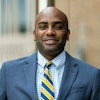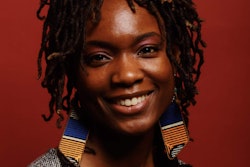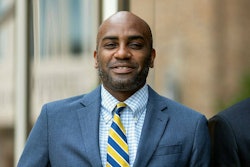WASHINGTON
The National Congress of Black Faculty met here last
month for their twelfth annual conference to discuss a host of topics
that ranged from affirmative action’s impact on Black access to higher
education, to the role of Black scholars in shaping public policy, to
the importance of computer literacy.
According to the organization’s president, Dr. Barbara Murray,
nearly fifty Black faculty members from institutions around the country
attended the four-day conference in order to collaborate “on issues
that challenge our survival in higher education.”
Keynote speaker Dr. Robert Hill, director of the Institute for
Urban Research at Morgan State University, urged the conference members
to take an active role in research, noting that Black researchers have
been sluggish in recent years.
“This group needs to be an advocate for positive research. Most of
the research monies don’t go to us, but they’re going to research on us
— welfare, homelessness, all these issues, they’re us,” he said.
“Funding agencies do not recognize that minority researchers tend to
ask different questions of the same data.”
Citing Black America’s outcry over what is perceived as poorly used
census data, Hill warned that it’s crucial that Black scholars play
more of a role in research that affects policy issues.
“People say that Blacks are distrustful of research. We’re
distrustful of exploitative research,” he said. “We need research more
than anyone else. But we want to be able to be more in control of it
and we want to be able to define the issue. Because unless we define
the issues, we’ll keep getting what we’re getting now.”
He rebuked the demise of many once-popular Black research vehicles
such as the Urban League’s now defunct State of Black America and the
Congressional Black Caucus’s research accord with the Joint Center for
Political Studies.
“In the seventies, we had more Black research institutes than we
have now. Overtime, however, those entities have disappeared,” he said.
“The State of Black America gave visibility to Black scholars who would
have never gotten that visibility. They say we don’t have any scholars.
Every State of Black America showed these economists and psychologists
and political scientists — all these scholars we have in our community.
“There’re some real issues that we have to deal with about our
relationship with research,” he continued. “We are now almost going
into the year 2000 and there seems to be some inability to understand
— even in our Black leadership — how to use research.”
At another session, conference attendees hacked out their fears concerning technology in the classroom.
Walter Dean and Tonja Ringgold, both assistant professors at
Baltimore City Community College, led the discussion, sharing ways they
learned to conquer their own fears and get students more involved.
Dean implored the Black educators to keep up with the technology
revolution and incorporate it in their classrooms so that Black
students don’t get left behind.
“There are students who’ve been at our campus for almost two years
and have never touched a computer,” he said. “Because somehow or
another, despite all this technology on campus, teachers are not making
students use the technology.
“That’s a concern because in this day and age of computer
illiteracy for the have-nots, if we as Black folks do not make our
students learn how to use that computer, they will be handicapped,” he
continued. “Not only in the job market, but when they go to another
college where it will be assumed that they have basic, fundamental
computer skills.”
Dean said that he breaks the ice with students by asking for a show
of hands from those who are computer illiterate. He then chooses one of
them to serve as his guinea pig for the day’s lesson to demonstrate
just how easy much of the technology is.
Many conference members said they fear technology because they know
some students were more savvy with it than they are. Others said they
dread getting in front of the class and looking foolish when technology
fails on them.
Vera Glover, a professor at Bunker Hill Community College in
Boston, said that she was once terribly embarrassed in front of her
class when she stumbled upon a pornographic Web site. When she couldn’t
quickly get out of the site, she unplugged the whole computer.
“Now, I get nervous just looking at a computer,” said Glover, a
surgical technology instructor. “I can deliver babies, I can do a host
of other amazing things, but when it comes to that computer, I get
nervous.”
Still others said they simply weren’t required by their schools or departments to use technology, so they didn’t.
Ringgold said that in her department, all professors were required
to have their own home page where students could access the course
syllabus, e-mail the professor, and link to other online materials
relevant to the class.
“I have them use that. I even put music on it to make it pleasant for them while they’re in there,” she said.
Ringgold assured that getting over her technology anxieties has
made learning much more comprehensive for herself and her students.
“At the end of the semester, I take a little survey and students
will tell me that they report better comprehension from having to use
this,” she said.
She said that now, she only uses class texts that are also offered
online or are accompanied by a CD-ROM. Many, she said, offer virtual
study guides and practice quizzes that she’s found have bolstered
student performance.
She also encourages students to print out chapter notes and bring them to class.
“It helps so they don’t have to write when they come to class,” she
said. “Sometimes I find that when they write, they’re writing and not
really hearing what I’m saying. This way they can concentrate on
listening and understanding what I’m saying.”
One trick that has worked for Ringgold consists of giving students
an extra impetus to incorporate technology in their homework.
“The types of things that I have them doing are simple,” she said.
“Look-ups on the Internet instead of using the standard library book
search. I have them e-mail the results to me.
“If I said to them, `Okay, today we’re going to learn how to
e-mail,’ they probably wouldn’t get too excited,” she said. “But link
it to something that’s motivating like a little extra-credit and boy,
they’ll learn how to use it.”
COPYRIGHT 1998 Cox, Matthews & Associates
© Copyright 2005 by DiverseEducation.com















